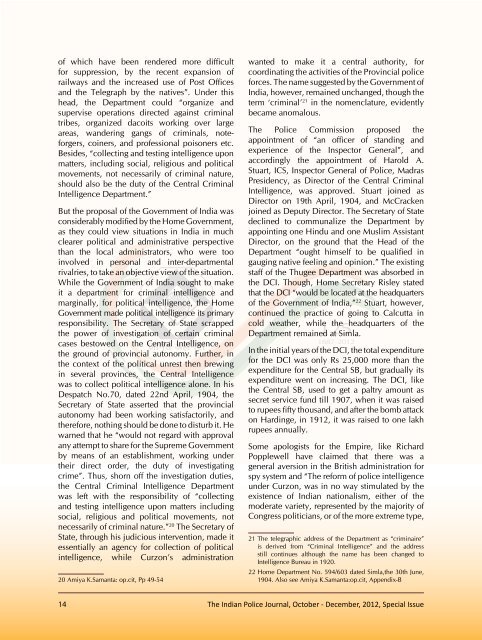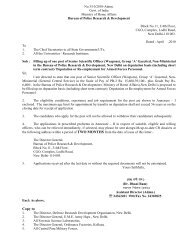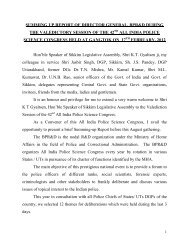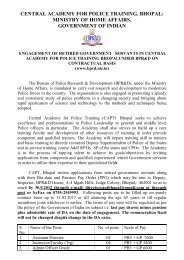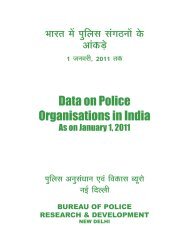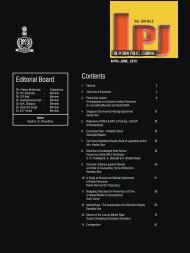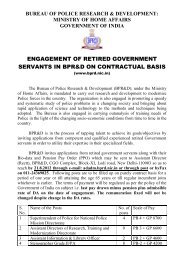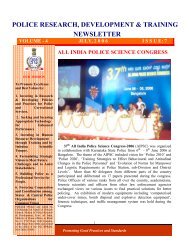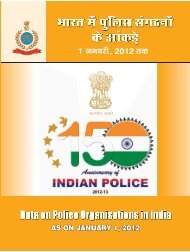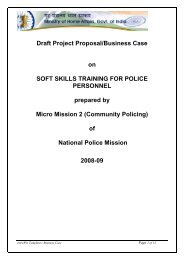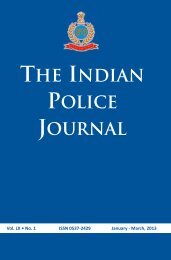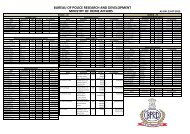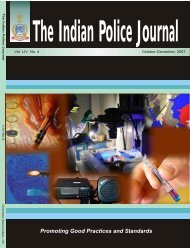<strong>of</strong> which have been rendered more difficultfor suppression, by the recent expansion <strong>of</strong>railways <strong>and</strong> the increased use <strong>of</strong> Post Offices<strong>and</strong> the Telegraph by the natives”. Under thishead, the Department could “organize <strong>and</strong>supervise operations directed against criminaltribes, organized dacoits working over largeareas, w<strong>and</strong>ering gangs <strong>of</strong> criminals, noteforgers,coiners, <strong>and</strong> pr<strong>of</strong>essional poisoners etc.Besides, “collecting <strong>and</strong> testing intelligence uponmatters, including social, religious <strong>and</strong> politicalmovements, not necessarily <strong>of</strong> criminal nature,should also be the duty <strong>of</strong> the Central CriminalIntelligence Department.”But the proposal <strong>of</strong> the Government <strong>of</strong> India wasconsiderably modified by the Home Government,as they could view situations in India in muchclearer political <strong>and</strong> administrative perspectivethan the local administrators, who were tooinvolved in personal <strong>and</strong> inter-departmentalrivalries, to take an objective view <strong>of</strong> the situation.While the Government <strong>of</strong> India sought to makeit a department for criminal intelligence <strong>and</strong>marginally, for political intelligence, the HomeGovernment made political intelligence its primaryresponsibility. The Secretary <strong>of</strong> State scrappedthe power <strong>of</strong> investigation <strong>of</strong> certain criminalcases bestowed on the Central Intelligence, onthe ground <strong>of</strong> provincial autonomy. Further, inthe context <strong>of</strong> the political unrest then brewingin several provinces, the Central Intelligencewas to collect political intelligence alone. In hisDespatch No.70, dated 22nd April, 1904, theSecretary <strong>of</strong> State asserted that the provincialautonomy had been working satisfactorily, <strong>and</strong>therefore, nothing should be done to disturb it. Hewarned that he “would not regard with approvalany attempt to share for the Supreme Governmentby means <strong>of</strong> an establishment, working undertheir direct order, the duty <strong>of</strong> investigatingcrime”. Thus, shorn <strong>of</strong>f the investigation duties,the Central Criminal Intelligence Departmentwas left with the responsibility <strong>of</strong> “collecting<strong>and</strong> testing intelligence upon matters includingsocial, religious <strong>and</strong> political movements, notnecessarily <strong>of</strong> criminal nature.” 20 The Secretary <strong>of</strong>State, through his judicious intervention, made itessentially an agency for collection <strong>of</strong> politicalintelligence, while Curzon’s administration20 Amiya K.Samanta: op.cit, Pp 49-54wanted to make it a central authority, forcoordinating the activities <strong>of</strong> the Provincial policeforces. The name suggested by the Government <strong>of</strong>India, however, remained unchanged, though theterm ‘criminal’ 21 in the nomenclature, evidentlybecame anomalous.The <strong>Police</strong> Commission proposed theappointment <strong>of</strong> “an <strong>of</strong>ficer <strong>of</strong> st<strong>and</strong>ing <strong>and</strong>experience <strong>of</strong> the Inspector General”, <strong>and</strong>accordingly the appointment <strong>of</strong> Harold A.Stuart, ICS, Inspector General <strong>of</strong> <strong>Police</strong>, MadrasPresidency, as Director <strong>of</strong> the Central CriminalIntelligence, was approved. Stuart joined asDirector on 19th April, 1904, <strong>and</strong> McCrackenjoined as Deputy Director. The Secretary <strong>of</strong> Statedeclined to communalize the Department byappointing one Hindu <strong>and</strong> one Muslim AssistantDirector, on the ground that the Head <strong>of</strong> theDepartment “ought himself to be qualified ingauging native feeling <strong>and</strong> opinion.” The existingstaff <strong>of</strong> the Thugee Department was absorbed inthe DCI. Though, Home Secretary Risley statedthat the DCI “would be located at the headquarters<strong>of</strong> the Government <strong>of</strong> India,” 22 Stuart, however,continued the practice <strong>of</strong> going to Calcutta incold weather, while the headquarters <strong>of</strong> theDepartment remained at Simla.In the initial years <strong>of</strong> the DCI, the total expenditurefor the DCI was only Rs 25,000 more than theexpenditure for the Central SB, but gradually itsexpenditure went on increasing. The DCI, likethe Central SB, used to get a paltry amount assecret service fund till 1907, when it was raisedto rupees fifty thous<strong>and</strong>, <strong>and</strong> after the bomb attackon Hardinge, in 1912, it was raised to one lakhrupees annually.Some apologists for the Empire, like RichardPopplewell have claimed that there was ageneral aversion in the British administration forspy system <strong>and</strong> “The reform <strong>of</strong> police intelligenceunder Curzon, was in no way stimulated by theexistence <strong>of</strong> Indian nationalism, either <strong>of</strong> themoderate variety, represented by the majority <strong>of</strong>Congress politicians, or <strong>of</strong> the more extreme type,21 The telegraphic address <strong>of</strong> the Department as “criminaire”is derived from “Criminal Intelligence” <strong>and</strong> the addressstill continues although the name has been changed toIntelligence <strong>Bureau</strong> in 1920.22 Home Department No. 594/603 dated Simla,the 30th June,1904. Also see Amiya K.Samanta:op.cit, Appendix-B14The Indian <strong>Police</strong> Journal, October - December, 2012, Special Issue
epresented by Tilak <strong>and</strong> his followers.” 23 Thisis not borne out by the plethora <strong>of</strong> intelligencerecords 24 , which show that, not to speak <strong>of</strong>political leaders, non-political personalities likeRabindranath Tagore, were under surveillance <strong>of</strong>the Special Branch. On the same issue, anotherBritish author, Patrick French has written, “Forthe last three decades <strong>of</strong> British rule in India,intelligence gathering was extended massively,since with the rapid rise <strong>of</strong> Congress it was seento be the only way <strong>of</strong> retaining the upper h<strong>and</strong>.Covertly obtained information began to takeon an increasing importance in the formulation<strong>of</strong> policy <strong>and</strong> decision making…” 25 There isno doubt that in the post-Curzon period, thecolonial regime depended more <strong>and</strong> more onsecret intelligence. But it may be noted herethat both the Viceroy <strong>and</strong> the Secretary <strong>of</strong> State,discouraged the DCI to have an independent network<strong>of</strong> sources or separate units in the provincesunder its control, without the knowledge <strong>of</strong> theProvincial Governments.With the bomb making its appearance onthe political scene in India, DCI became,exclusively, an agency for collection <strong>and</strong> analysis<strong>of</strong> political intelligence. The term ‘criminal‘in the nomenclature became more <strong>and</strong> moreincongruous. In the Government <strong>of</strong> India Act,1919, the change <strong>of</strong> name was first indicated insection 40(2) which enjoined, inter alia, that theIntelligence <strong>Bureau</strong> should keep the Governmentposted with matters relating to the security <strong>of</strong>the Indian Empire. Even before the Act cameinto force in 1921, the name was changed toIntelligence <strong>Bureau</strong> in 1920.4. PROVINCIAL SPECIAL BRANCHESThe Provincial Special Branches were ignored tillthe anti-Partition swadeshi movement broke outin 1905 <strong>and</strong> the underground terrorist activitiescame to the surface in 1907-1908, in Bengalpresidency. When in April, 1906, the CriminalInvestigation Department (CID) was set up inBengal, as also in other provinces, the SpecialBranches were made a part <strong>of</strong> the ProvincialCIDs under one DIG. Later on, with the increasein the work-load <strong>of</strong> the Special Branches <strong>and</strong> due23 Richard Popplewell: op.cit. P4524 Circulars <strong>of</strong> Intelligence (Special) Branch, No 6SB dated 27July 1909.25 Patrick French: Liberty or Death, 1997, Pp 98-99to growing political unrest, in the big provinces,the Special Branches were delinked from CID<strong>and</strong> brought under <strong>of</strong>ficers <strong>of</strong> a suitable rank.Bengal’s Special Branch had a faster growth,both in size as also in quality <strong>of</strong> intelligenceoutput, due to strident political movement,both surface <strong>and</strong> underground. In September,1907, Stevenson-Moore 26 , Director, CriminalIntelligence Department, predicted in his reportthat the Bengalis ‘had no capacity for violence’.One district magistrate <strong>of</strong> Dacca, who held theview that bhadralok Bengalis were incapable<strong>of</strong> physical aggression, was shot at the station 27 ,while he was leaving Dacca on transfer. In thiscontext, the discovery <strong>of</strong> arms <strong>and</strong> explosives inMuraripukur Garden at Calcutta, <strong>and</strong> the arrest<strong>of</strong> Aurobindo Ghose along with 40 educatedbhadralok youths, made them change theirideas. Home Secretary, Harold Stuart wrote, “therevolutionary movement will gain in influence<strong>and</strong> strength until, at no distant date, it willbecome a serious menace to law <strong>and</strong> order.”But the Government was <strong>of</strong> the consideredview that “while a revolutionary rising is out<strong>of</strong> the question”, an efficient secret service wasessential” to contain any widespread disturbancein the province.The Bengal Special Branch, like Special Branchesin other provinces, was placed as a separate unitunder a Deputy Inspector General <strong>of</strong> <strong>Police</strong>, CID.An <strong>of</strong>ficer <strong>of</strong> the rank <strong>of</strong> SP, named Denham 28 ,was appointed as Special Officer <strong>of</strong> the SpecialBranch, which was strengthened by posting agood number <strong>of</strong> <strong>of</strong>ficers.There was one Special Branch <strong>and</strong> one CID forthe whole <strong>of</strong> Bengal, including Calcutta, bothdrawing <strong>of</strong>ficers from Bengal <strong>and</strong> Calcutta policeforces because they were statutorily separateentities. This led to mutual recrimination, in whichhigher <strong>of</strong>ficers like DIG, CID <strong>and</strong> Commissioner<strong>of</strong> <strong>Police</strong> were involved. Eventually to resolve the26 Sir Charles Stevenson-Moore succeeded H.A. Stuart whobecame Home Secretary.27 B.C.Allen had praised the social service <strong>and</strong> discipline <strong>of</strong> themembers <strong>of</strong> the Dacca Anushilan Samiti, a member <strong>of</strong> whichshot him. The assailant was never caught.28 Godfrey Denham was a fine intelligence <strong>of</strong>ficer <strong>and</strong> some <strong>of</strong>his reports are valuable source materials <strong>of</strong> the revolutionaryterrorist movement in India. An unsuccessful attempt wasmade on his life in 1911 in Calcutta <strong>and</strong> in 1912 he joinedthe Central Intelligence <strong>and</strong> played a key role in unravelingthe plot to kill the Viceroy. In 1917 he was with the MI5helping the prosecution in San Francisco Conspiracy case.He did not return to the service in India.The Indian <strong>Police</strong> Journal, October - December, 2012, Special Issue 15
- Page 1 and 2: The Indian Police JournalOctober -
- Page 3 and 4: From the Director’s DeskNew Delhi
- Page 5 and 6: 23rd December, 1887: TheJourney beg
- Page 7 and 8: Courtesy - National Archives of Ind
- Page 9 and 10: The Logo released on the completion
- Page 11 and 12: Helmsmen of the IB during thePre-In
- Page 13 and 14: SHRI V.G. VAIDYA, IPS(MAR 1992 TO J
- Page 15 and 16: “Sleeman sahib ki jai”“No Cri
- Page 17 and 18: their life and their problems relat
- Page 19 and 20: Settling down of criminal tribes wa
- Page 21 and 22: perish. Between 1841 and 1848, anot
- Page 23 and 24: In conclusion, I would like to reco
- Page 25 and 26: own race alone, had to be withdrawn
- Page 27: a bee in his bonnet” 17 , and abo
- Page 31 and 32: The agency more and more fine-tuned
- Page 33 and 34: US was brewing, one William Hopkins
- Page 35 and 36: came under the control of Indian mi
- Page 37 and 38: neutralised many efforts by inimica
- Page 39 and 40: e published by the Intelligence Bur
- Page 41 and 42: As DD (Security), IB, I had occasio
- Page 43 and 44: Chhomohlohri, all of them juxtapose
- Page 45 and 46: Dormers Building, ShimlaThe Dormers
- Page 47 and 48: eforms. Warren Commission, on the a
- Page 49 and 50: and systems will increasingly come
- Page 51 and 52: violence and destabilisation. This
- Page 53 and 54: one develop. The all pervasive cult
- Page 55 and 56: etween the states and the centre su
- Page 57 and 58: Intelligence Agencies inIndian Demo
- Page 59 and 60: Democracies are, today, everywhere
- Page 61 and 62: depend substantially on the restrai
- Page 63 and 64: Of Pistols and Pigs andthe Old Tidd
- Page 65 and 66: it is lovingly caressed hundreds of
- Page 67 and 68: Through the Eyes of an IB OfficerSh
- Page 69 and 70: an Intelligence agency. He used to
- Page 71 and 72: My J&K ExperienceShri R.K. Kapoor,
- Page 73 and 74: there. We remained stranded there f
- Page 75 and 76: Scaling Himalayan Heights withthe I
- Page 77 and 78: proceed to Dungti to supervise the
- Page 79 and 80:
tour of the White House and Lincoln
- Page 81 and 82:
into unconsciousness two hours earl
- Page 83 and 84:
which was completed successfully wi
- Page 85 and 86:
leaders. This happened around the t
- Page 87 and 88:
My Unforgettable Yearsin the North-
- Page 89 and 90:
stated that Prakash Singh, Assistan
- Page 91 and 92:
take her into confidence. That woul
- Page 93 and 94:
Police - Intelligence InterfaceShri
- Page 95 and 96:
Shreekant Bapat and I surveyed the
- Page 97 and 98:
excellence, dedication and commitme
- Page 99 and 100:
Immigration, Inter-State Disputes,
- Page 101 and 102:
Observations on India’s State and
- Page 103 and 104:
assessments that arose after the ca
- Page 105 and 106:
levels. The deficiencies of one par
- Page 107 and 108:
of laying a network of useful roads
- Page 109 and 110:
Technology in Intelligence-Future S
- Page 111 and 112:
These are just some of the aspects
- Page 113 and 114:
Figure 6: Open Source Information o
- Page 115 and 116:
events) and inference from evidence
- Page 117 and 118:
9North Atlantic Treaty Organization
- Page 119 and 120:
Shri Dave was posted back to the lB
- Page 121 and 122:
He even suggested separate pay scal
- Page 123 and 124:
The Unsung HeroesThe Intelligence B


